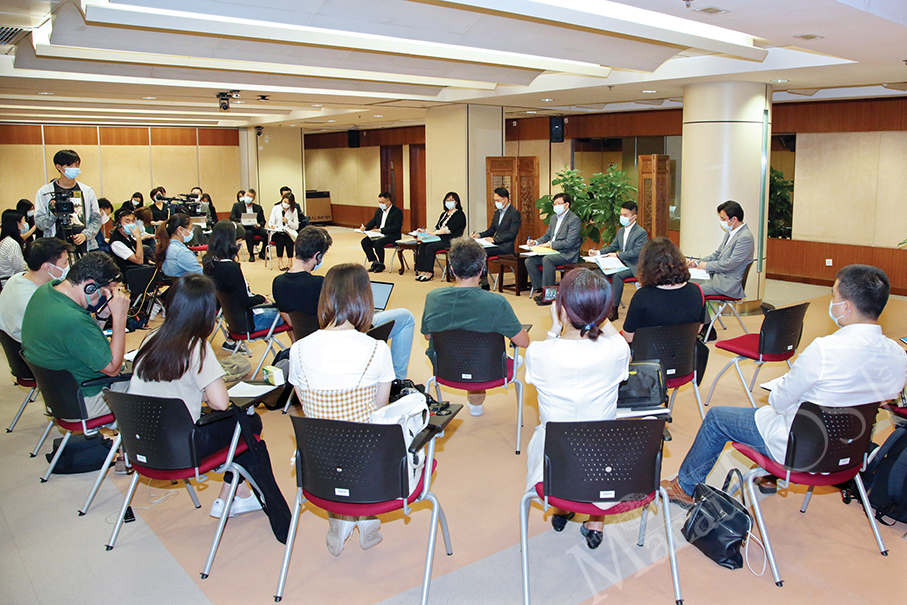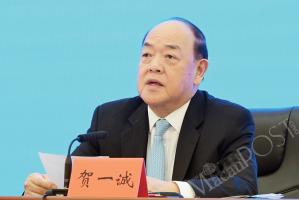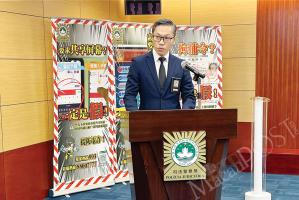2021-05-28 03:05 Comment:0
Prisca Tang
The former Education and Youth Affairs Bureau and the former Higher Education Bureau merged and became the new Education and Youth Development Bureau (DSEDJ) on February 1.
During a recent interview DSEDJ Director Lou Pak Sang told The Macau Post Daily that he is committed to strengthening the transition between the non-tertiary and tertiary education systems in order to educate more talents for civil society. He also said that the merging of the two bureaus will help improve the utilisation of education resources. He added that rearranging the resources for elementary and higher education can strengthen the transition between the two. He stressed that “the aim of the bureau right now is to educate local students to be patriotic, responsible, full of dreams and willing to contribute to the nation and Macau”.
Lou pointed out that the education system and youth development are the bureau’s main concerns. He said that the education aspect covers higher, secondary, primary and pre-school education, vocational and special needs education, as well as family education, patriotic education, community education and continuing studies.
DSEDJ Director Lou Pak Sang talks to The Macau Post Daily earlier this month at the bureau’s headquarters. Photo: Iong Tat Choi
Advantages of merger
Lou said he hoped that after the merger, through resource allocation and organisational restructuring, he could reinforce the advantages of the joint bureau. He explained that in terms of resource allocation, he hoped that by utilising the strength of the former higher education bureau’s skills and resources, he could provide primary and secondary schoolchildren with a bigger support system.
“For example, the University of Macau’s (UM) ‘Base for Primary & Secondary Science & Technology Education’ and ‘Macau Base for Primary & Secondary STEM Education’ [Science, Technology, Engineering, and Mathematics] are examples of using higher education’s resources for the non-higher education system,” Lou said.
Lou also said that in terms of organisational restructuring, his bureau has a new department to handle pupils and students’ issues, adding that their work covers primary and secondary schoolchildren and higher education students. He pointed out that in the future, planning and policies will effectively run through non-higher education, higher education and youth areas; it can also provide better counselling for students in terms of further studies and career planning.

This handout photo provided by the DSEDJ shows DSEDJ Director Lou Pak Sang (front row, fourth from right) and Secretary for Social Affairs and Culture Elsie Ao Ieong U (front row, fifth from right) at an inauguration ceremony in February.

This handout photo provided by the DSEDJ shows Secretary for Social Affairs and Culture Elsie Ao Ieong U (second from left) attending Lou Pak Sang’s swearing-in ceremony as the bureau’s new director in February.
More quality, higher subsidy
Even though reports show that Macau students’ overall quality has been improving, there are still a lot of them seeking a tutor outside of school. When asked whether this is because the quality of school teachers was not sufficient, Lou said since the implementation of the law on the non-tertiary education sector’s general and teaching personnel, the quality of education workers has been improving steadily. He added that different support classes and education work should focus on students’ studies and growth, as well as strengthening their basics in order to meet their further education and career needs. However, he acknowledged that students have different needs, therefore the bureau also subsidises schoolchildren attending courses offering different kinds of assistance.
“Private education centres also take on various names and roles, for example, besides tutoring children, they also provide meals and childcare services. Those institutions help families that have working parents take care of and look after their children. They also help alleviate the parents’ burden,” Lou pointed out.
Concerning teachers, Lou pointed out that the government has implemented a ranking system for teachers – as a teacher studies more or gains more experience, he or she can move up in the ranking, as a result a higher rank leads to a higher salary. Meanwhile, many residents are worried that some schools appear to have an inclination to hire young inexperienced teachers as they cost less. However, Lou said those worries were unwarranted because since 2012/2013, the number of first-class teachers has been rising steadily.
Lou stressed that each year when the bureau decides on a budget for the free education subsidy, his team will assess the experience and ranking of each teacher in local schools. He said that in recent years, the subsidy that the bureau provides can cover schools’ extra expenses caused by the increased salaries of their teachers.
More local students opt to enrol locally
Since the COVID-19 pandemic began, education institutions in neighbouring regions have changed quite a bit.
“As Macau’s higher education institutions’ quality has been gaining international recognition, and also in the wake of the impact of the COVID-19 pandemic, more and more bright students from the mainland have started to take an interest in pursuing a degree at Macau universities,” Lou underlined.
According to DSEDJ figures, in the past two years the number of first-year local students at Macau higher education institutions stood at around 4,300-4,400 while in 2019-2020 the number of non-local first-year students was 6,854 (6,491 from the mainland and 363 from other regions or countries) and in 2020/2021 the number rose to 8,154 (7,919 from the mainland and 235 from other regions or countries).
“A survey last year shows that this school year (2020/2021) 48 percent of local pupils would like to continue their education in Macau, while 33 percent wanted to study in the mainland and 9 percent in Taiwan,” Lou noted.
Chief Executive Ho Iat Seng has previously emphasised that the government has put a lot of resources into local education. According to Lou, in the 2019/2020 school year, under the free education school system a private school pupil got a subsidy of 620,000 patacas in total from the government in the span of 15 years, while a pupil from a private school that was not in the system received a 340,000-pataca subsidy in the same period of time.

In December last year, the Education and Youth Affairs Bureau invited 46 secondary school students from 24 schools to visit State Key Laboratory and Base for Primary & Secondary Science & Technology Education on University of Macau’s Campus. Photo: DSEDJ
3 aims & 8 directions
Lou noted that last December the government promulgated the higher education development plan for the next 10 years (2021-2030). He underlined that the plan has “three aims and eight directions”.
The three aims are: 1) to educate outstanding talents, 2) to guide academic research and 3) to serve the Special Administrative Region’s development. Lou explained that the eight directions comprise optimising the education system, improving student recruitment standards and class structures, strengthening the education institutions’ development and resource sharing, ensuring the continuing rise of tertiary education quality, bringing up students’ overall development, improving teachers’ professional level, encouraging the development of technological inventions and innovations and industry-university-research institute cooperation, and increasing cooperation opportunities between regions.
The government will also publish the Medium and Long-Term Plan of Non-Tertiary Education (2021-2030) and Macao Youth Policy (2021-2030).
Lou stressed that besides taking care of youths’ manners and moral, physical and mental health, as well as their comprehensive abilities, the bureau would also concentrate on educating youths with the aim of ensuring that they develop a responsible mindset, apart from deepening youths’ relationship with the Motherland and the world, assisting them in planning their lives and encouraging them to exchange and apply their knowledge.
“We will strive to improve the school system, optimise the subsidy schemes and benefit plans, control the allocation of resources used to encourage educational development, support education exchanges and increase cooperation opportunities with nearby regions, consequently providing civil society with more talents. Besides, we will also strengthen inter-departmental cooperation to support young people’s development, assist local youths in finding career opportunities in the city in conjunction with the Greater Bay Area’s (GBA) construction and the nation’s development,” Lou concluded.

DSEDJ Director Lou Pak Sang briefs the media about his bureau’s latest work earlier this month. Photo: DSEDJ
 Macau to host 4 competitive, 1 mass sports events for 15th National Games
Macau to host 4 competitive, 1 mass sports events for 15th National Games
 Macau, HK, Guangdong finetuning deal on joint emergency response in GBA: Macau fire chief
Macau, HK, Guangdong finetuning deal on joint emergency response in GBA: Macau fire chief
 Local victim of ‘fake police scam’ rescued by Macau cops in Mexico: PJ chief
Local victim of ‘fake police scam’ rescued by Macau cops in Mexico: PJ chief